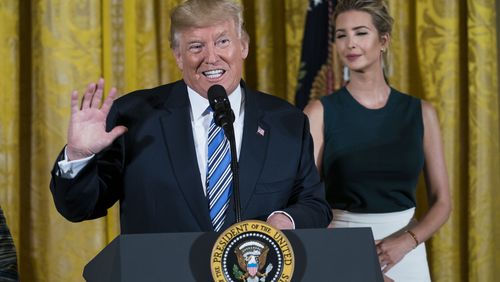Having just spent a year visiting colleges and now having attended new student orientations at Georgia Tech and the University of Georgia, I wonder about the reported concerns of the Trump administration that white students are being shut out by affirmative action policies.
Georgia's public institutions don't consider race as an admissions factor. (The state's public colleges haven't used affirmative action in admissions since the University of Georgia's admissions policy was ruled unconstitutional in 2001 by a federal appeals court.) While the state seeks to draw more minority students to its public campuses and has seen some improvement, the most competitive campuses in Georgia do not reflect the racial makeup of the k-12 student population.
There was no shortage of white students at Georgia’s premier research universities and the half-dozen or so elite universities we toured. But don’t take my word. According to state data, about 70 percent of UGA’s students are white, 10 percent are Asian and 8 percent are African-American. Half of Georgia Tech's freshmen last year were white; 25 percent Asian; 8 percent Hispanic and 6.5 percent black.
Yet, according to The New York Times:
The document, an internal announcement to the civil rights division, seeks current lawyers interested in working for a new project on "investigations and possible litigation related to intentional race-based discrimination in college and university admissions."...Supporters and critics of the project said it was clearly targeting admissions programs that can give members of generally disadvantaged groups, like black and Latino students, an edge over other applicants with comparable or higher test scores.
The Supreme Court has ruled that the educational benefits that flow from having a diverse student body can justify using race as one factor among many in a "holistic" evaluation, while rejecting blunt racial quotas or race-based point systems. But what that permits in actual practice by universities — public ones as well as private ones that receive federal funding — is often murky.
Many civil rights advocates are reacting this morning to the Times report. “I am deeply disheartened that the Trump administration appears to be taking a hard line against efforts to increase campus diversity rather than focusing on addressing the persistent opportunity gaps facing students of color and low-income students,” said former Obama White House U.S. Secretary of Education John B. King, now president of Education Trust.
What's puzzling about this news is it comes at a time when colleges are beginning to consider socioeconomic diversity, recognizing the under enrollment of poor kids across all race on their campuses.
Colleges already weigh many factors beyond academics, including athletic skill, geography and status. Everyone seems to accept that colleges regularly admit football, gymnastics and soccer players with lower test scores and grade point averages than required. And they bend their standards to admit the children of celebrities, state senators and other influential people.
While at the Education Writers Association conference in June, I attended a panel about how legislators wield influence in getting unqualified applicants admitted to law school in Texas and how the kids and grandkids of donors earn a closer look in Virginia.
I saw the kid-glove treatment of donors firsthand on a college visit to a prestigious northeastern university where an 11th grader on our tour told me she wanted to study astrology and theater. We were at a prominent STEM campus so I expressed surprise that she'd consider such a school for those disciplines. She explained her grandfather had attended and remained a major supporter. In fact, she and her grandfather had already met with the president of the university that morning and were having lunch with another official at lunch.
The news about the White House is alarming civil rights activists and higher ed researchers. Inside Higher Ed reports this morning:
And Stella M. Flores, an associate professor of higher education at New York University who has written extensively about inequality in American education, said that the Justice Department should be looking elsewhere.
"We know two key findings from educational research over the last 10 years in regard to this issue: 1) an overreliance on test scores as the key predictor of college success is a tenuous and often ineffective strategy; and 2) there are positive educational benefits of diversity to all students that extend beyond the classroom," she said. "As the nation continues to diversify at unprecedented levels and becomes more globally connected and interdependent, keeping the principle of the positive educational benefits of a diverse student body/college campus is one of the most certain strategies for ensuring the nation stays at the top of their social and economic prosperity levels. It would be more helpful to put more civil rights emphasis in examining issues of inequality in the nation's K-12 public system, which have long-term effects on college success outcomes. This would increase the opportunity levels of all students -- from the poorest of white students in addition to other underrepresented minority students."
Your thoughts? Is this a real problem or political theater?
About the Author







